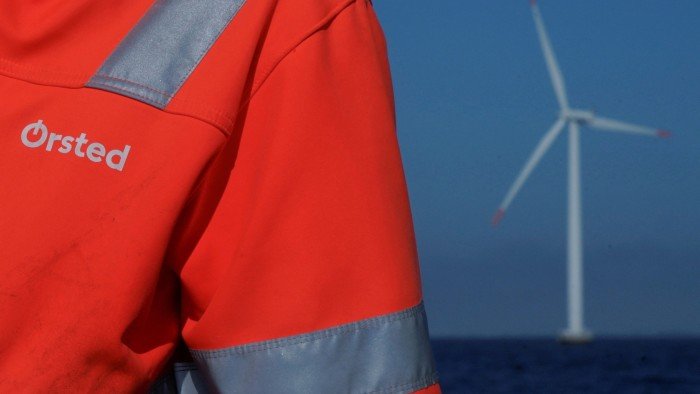Stay informed with free updates
Simply sign up to the Renewable energy myFT Digest — delivered directly to your inbox.
Shares in Ørsted plunged to a new record low on Monday after the Trump administration halted one of the Danish wind farm developer’s almost-completed projects in a move that shocked investors.
Friday’s order from the US Bureau of Ocean Energy Management to stop work on the $1.5bn Revolution Wind project, which is 80 per cent complete, sent Ørsted’s shares down 18 per cent in early trading on Monday to DKr175.
“It’s pretty devastating. It’s questionable whether the company can proceed with a rights issue with this uncertainty hanging over it,” said Jacob Pedersen, analyst at Sydbank.
The share move gives the company a market capitalisation of just DKr74bn.
It came even as the world’s largest offshore wind developer said on Monday morning that it was pressing ahead with plans to raise DKr60bn ($9.4bn) in fresh capital and still had the backing of its majority owner, the Danish government.
The one-time darling of the renewable energy sector, Ørsted has been hard hit by US President Donald Trump’s scepticism about offshore projects and a general hit to green power companies due to high interest rates.
Ørsted’s shares have fallen by almost 90 per cent since their 2021 peak, and some analysts have started to question whether the Danish group might need to walk away from its high-profile US projects to survive.
Revolution Wind — of which Ørsted and a BlackRock unit each own half — was due to begin operations next year and supply enough power for 350,000 homes in Rhode Island and Connecticut under 20-year contracts.
In its stop-work order on Friday, the US cited the need “to address concerns related to the protection of national security interests”, without providing further details.
Ørsted said its share of the remaining investments on the project was DKr5bn and that it expected it to generate annual earnings before interest, tax, depreciation and amortisation of DKr1bn.
Investors have until now been more worried about Sunrise Wind, another US project, of which Ørsted owns 100 per cent. The DKr60bn rights issue was largely designed to enable the Danish group to fund the investment needed to finish the project of about DKr40bn.
Ørsted said the two wind farms had a total investment of about DKr100bn but that at the end of June the carrying value for its 50 per cent stake in Revolution and 100 per cent of Sunrise was DKr17bn.
The Trump administration stopped another offshore wind project earlier this year led by Norway’s Equinor before relenting, costing the oil and gas group about $800mn according to analysts.
But Norway enjoyed much better diplomatic ties with the US than Denmark due to finance minister Jens Stoltenberg’s relationship with Trump.
By contrast, Denmark’s relations with Trump are frosty after the US president has repeatedly said he wants to take control of Greenland from Copenhagen.
On Friday, Denmark’s foreign minister signed a partnership with Californian governor Gavin Newsom, the self-styled leader of the resistance to Trump.
Analysts at Citi said a similar delay to Equinor’s could lead to “a postponement to Ørsted’s planned equity raise, as well as its potential size, depending on the scale of additional costs associated with such a delay and the financial headroom already built in”.
Equinor itself became the second-largest shareholder in Ørsted last October but the Danish group’s shares have more than halved since the Norwegian oil and gas group announced its 10 per cent stake.

